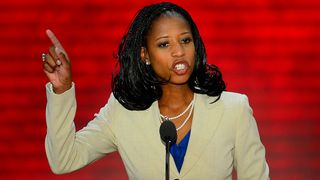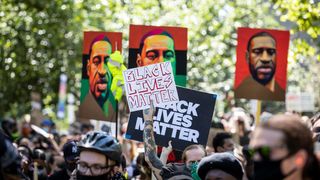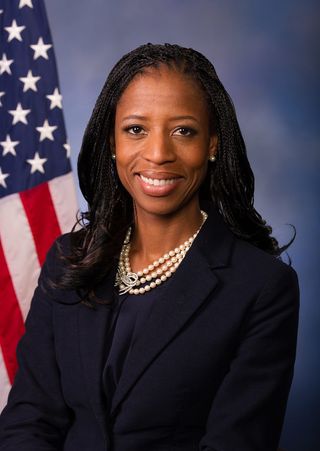Today marks one painful month since the murder of George Floyd. While in that time we've seen some promising bipartisan efforts to reform policing policies in the United States, unfortunately we've also seen the impact of the country's intense political polarisation.
Instead of working toward mutual understanding and unified action, the extreme polarisation in American discourse results in the constant demonisation of "the other side".
This polarisation pushes force people like me — who know all too well the challenges facing both police officers and black Americans — to "pick a side".
While I'm better known as the first black female Republican elected to the US Congress, earlier in my political career I was mayor of Saratoga Springs, a growing city in Utah.

One officer I will never forget
As the city's mayor, I initiated a policy to only hire police officers who actually reside in Saratoga Springs rather than neighbouring locales in Utah. I wanted our police department to be made up of officers who our residents went to church with and saw at local barbeques and neighbourhood gatherings. In addition to the daily interactions I had with these police officers, I also had the honour of swearing in new ones into our police force.
Instead of working toward mutual understanding and unified action, the extreme polarisation in American discourse results in the constant demonisation of "the other side".
I will never forget the name of one such officer I had the privilege of swearing in: Sergeant Derek Johnson.
Derek married his high-school sweetheart and, not long after his graduation, fulfilled his dream of becoming a police officer. I held Derek's sweet infant daughter in my arms at his swearing-in ceremony so that he could take a picture with his proud wife.
But just a few short years later, Derek was murdered on the job — leaving his wife and children without a husband and father. He was doing his job — stopping to inspect an oddly parked vehicle when he was shot multiple times by a criminal.
Unfortunately, Derek Johnson was one of many American police officers to suffer this fate. Every single year, dozens of law enforcement officers across the United States give the ultimate personal sacrifice and are killed in the line of duty.
My family has not been spared
At the same time, I — as the daughter and sister of black men and the mother of a mixed-race boy — also know first hand that too many black men in the United States suffer unjustly at the hands of law enforcement officers. My own family has not been spared such injustice.
A few years ago, my brother was working at an office supplies store in Connecticut when he decided to stop at a restaurant to grab lunch. As he left the restaurant, police officers tackled him with such force that his lunch was knocked out of his hands to the ground. He was handcuffed and about to be forced into the back of a police car when some white store owners approached the police officers and clarified that the man they had reported was not, in fact, my brother.
The fact that it took white store owners to intervene in my brother's wrongful arrest at the hands of the police — who are tasked with protecting the innocent — exemplifies the reality that too many black Americans are not provided the liberty of speaking for themselves.
Subsequently, the police officers released my brother and allowed him to go along his own way. Until that point, it had not been made clear to my brother why he was being treated so aggressively by the police officers.
He suffered the additional embarrassment of colleagues and onlookers witnessing the whole incident. Yet at no point did the police officers apologise for what happened — as a matter of fact, they told him that he should feel lucky that the owners came out when they did.
The fact that it took white store owners to intervene in my brother's wrongful arrest at the hands of the police — who are tasked with protecting the innocent — exemplifies the reality that too many black Americans are not provided the liberty of speaking for themselves.
My brother was carrying his lunch and wearing his work uniform, and yet at no point was he given the chance to speak for himself. The colour of his skin made it all too easy to overlook the fact that he may not have been the suspect in question.
Where to place our efforts?
Change is necessary. The status quo is simply untenable. With that said, we need to align our efforts in the right direction to enact substantive change. At present, too many efforts are misplaced.
Our collective enemy on these issues is indifference. We cannot be indifferent to the plight of black men at the hands of bad police officers. Nor can we be indifferent to the life-threatening dangers police officers face in the line of duty.
Until recently, I had forgotten about my brother's experience of injustice. I'm not sure why but it simply slipped my mind. Maybe that's because even black Americans would sometimes prefer not to look at the ugly in others.
But as difficult as it is to do, to confront America's divisive political polarisation, Americans can no longer look away from the ugly in others or even sometimes in ourselves.






